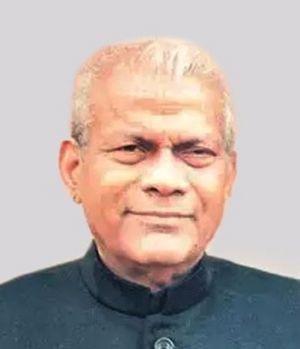Rabi Ray facts for kids
Quick facts for kids
Rabi Ray
|
|
|---|---|
|
ରବି ରାୟ
|
|

Portrait of Rabi Ray
|
|
| 9th Speaker of the Lok Sabha | |
| In office 19 December 1989 – 9 July 1991 |
|
| Prime Minister | Vishwanath Pratap Singh Chandra Sekhar |
| Deputy | Shivraj Patil |
| Preceded by | Balram Jakhar |
| Succeeded by | Shivraj Patil |
| Minister of Health and Family Welfare | |
| In office 25 January 1979 – 14 January 1980 |
|
| Prime Minister | Morarji Desai |
| Preceded by | Raj Narain |
| Succeeded by | Mohsina Kidwai |
| Member of Parliament, Lok Sabha | |
| In office 1989–1996 |
|
| Preceded by | Sarat Kumar Deb |
| Succeeded by | Srikant Kumar Jena |
| Constituency | Kendrapara, Odisha |
| In office 1967–1971 |
|
| Preceded by | Bibudhendra Mishra |
| Succeeded by | Banamali Patnaik |
| Constituency | Puri, Odisha |
| Member of Parliament, Rajya Sabha | |
| In office 3 April 1974 – 2 April 1980 |
|
| Constituency | Odisha |
| Personal details | |
| Born | 26 November 1926 Bhanagarh, Puri district, Odisha, British India |
| Died | 6 March 2017 (aged 90) Cuttack, Odisha, India |
| Political party | Janata Dal |
| Other political affiliations |
Janata Party (Secular), Janata Party, Samyukta Socialist Party, Socialist Party |
|
As of 11 July, 2009
Source: [1] |
|
Rabi Ray (born 26 November 1926 – died 6 March 2017) was an important Indian politician. He believed in socialism, which means he wanted fairness and equality for everyone. He was also a follower of Mahatma Gandhi's ideas. Rabi Ray served as the Speaker of the Lok Sabha, which is like the leader of one of India's main parliamentary houses. He was also a minister in the government. He came from the state of Odisha in India.
Contents
Early Life and Education
Rabi Ray was born on November 26, 1926, in a village called Bhanaragarh. This village is in the Puri district of Odisha. He went to Ravenshaw College in Cuttack and earned a degree in History. Later, he studied law at Madhusudan Law College, also in Cuttack.
He was married to Dr. Saraswati Swain. She was a medical doctor and later became a professor. Rabi Ray was a modern thinker and did not expect his wife to change her last name after they got married. She was a great support to him throughout his political life.
Rabi Ray's Political Journey
Before becoming a full-time politician, Rabi Ray was involved in India's fight for freedom. In early 1947, while he was still a student, he was arrested. This happened because he helped raise the Indian flag at Ravenshaw College. Even though India was still under British rule, the British government eventually allowed students to unfurl the Indian flag.
Rabi Ray strongly believed in socialism from his college days. In 1948, he joined the Socialist Party. He was a natural leader and very dedicated to his beliefs. He quickly became a key figure in the socialist movement. From 1953 to 1954, he was the Joint Secretary of the All India Samajwadi Yuvak Sabha.
In 1956, he helped start the Socialist Party in Odisha. He was also a member of the party's national leadership. Later, in 1960, he became the General Secretary of the party for about a year.
Serving in Parliament
In 1967, Rabi Ray was elected to the Lok Sabha (the lower house of India's Parliament). He represented the Puri area in Odisha. During this time, he led the parliamentary group for the Samyukta Socialist Party.
In 1974, he was elected to the Rajya Sabha (the upper house of Parliament) from Odisha. He served there until 1980. From January 1979 to January 1980, he was the Union Minister of Health and Family Welfare. This meant he was in charge of health-related matters for the whole country.
Speaker of the Lok Sabha
In 1989, Rabi Ray was elected to the Lok Sabha again. This time, he represented the Kendrapara area in Odisha. On December 19, 1989, he was chosen to be the Speaker of the Lok Sabha. This is a very important role, like being the referee or chairperson of the main parliamentary debates. Everyone agreed on his selection.
He was known for being fair and honest. His unbiased approach made the Speaker's office more respected. In 1991, he was re-elected to the Lok Sabha from the same area.
Rabi Ray was very strict about following rules. When some Members of Parliament tried to switch parties, he made sure they followed the rules against changing parties. He was firm in his decisions to uphold the law.
Later Years and Community Work
After 1997, Rabi Ray became involved with a group called Lok Shakti Abhiyaan. This group was not political. He led a movement to fight against corruption and too much power being held in one place. He traveled across India to promote honesty and openness in public life.
He was also part of the Citizens Initiative for Peace. This group worked to find peaceful solutions to conflicts, like the Naxalite–Maoist insurgency in India. Rabi Ray also wrote many articles about current political and social issues. These articles appeared in newspapers and journals in Oriya, Hindi, and English.
Awards and Recognition
Rabi Ray received several important awards for his work:
- Light Of Truth (2002): He received this award on behalf of the people of India.
- Shanti Doot International Award: This honor was given by the World Peace Movement Trust India.
- Kalinga Ratna (2008): Another prestigious award he received.
 | Kyle Baker |
 | Joseph Yoakum |
 | Laura Wheeler Waring |
 | Henry Ossawa Tanner |

